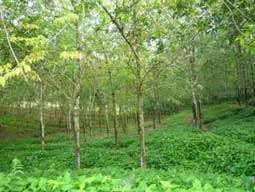Japan’s Bridgestone Corporation says that it has approved plans to strengthen investments in natural rubber plantations it owns in Southeast Asia, by pumping in US$26.7 million by 2030, to enhance productivity of the plantations. It adds it will double harvest volumes by 2035, compared with 2022 projections. It owns a 17,900 ha plantation in Sumatra, and 6,000 ha plantation in Kalimantan, both in Indonesia.
Initiatives to increase the harvest include introduction of elite trees with stable harvest volume, which are selected by genome analysis technology and ongoing, systematic afforestation for ensuring that the Bridgestone plantations are properly managed depending on tree age and afforestation cycle. Other measures include using artificial intelligence (AI) image analysis to diagnose and detect disease in Para rubber trees and big data to implement optimal plantation for higher yield.
At the same time, it adds that it will bolster its initiatives to contribute to circular economies and carbon neutrality across the entire value chain through sustainable operation of natural rubber plantations.
The group considers it is important to secure reliable supplies of natural rubber resources so that it can advance sustainable tyre technologies and solutions.
In its long-term environmental vision, Bridgestone says it has set the long-term environmental vision targeting 2050 and beyond of achieving carbon neutrality and 100% use of sustainable 3/4 materials.
These natural rubber plantation initiatives are part of its efforts to accelerate sustainability initiatives across the value chain for accomplishing these goals. Through sustainable operation of the natural rubber plantations owned by Bridgestone, it adds it is currently contributing to the maintenance of approximately 5.9 million tonnes of CO2 it fixates in trees, and will continue to enhance it through tree planting in devastated areas and expanding elite trees.
Moreover, the operation of owned plantations requires Bridgestone to promote harmony with communities. At owned plantations in Southeast Asia, Bridgestone also provided the access to its clinic to local communities and supported vaccination of Covid-19, while contributed to schooling including donation of personal computers for students to help their studies.
Such efforts also include distributing Para rubber tree seedlings to small-scale farmers and teaching them techniques for improving productivity, promoting employment in local communities.

